Feeding cats with sensitive stomachs can be a delicate task. Selecting the right cat food that is both nutritious and gentle on the stomach is crucial for their health and well-being. This article explores options for the best cat food tailored to cats with digestive sensitivities.
Understanding Sensitive Stomachs in Cats
- Common Causes: Sensitive stomachs in cats can arise from various factors, including food intolerances, allergies, or underlying health conditions like inflammatory bowel disease.
- Identifying Symptoms: Symptoms indicating a sensitive stomach include frequent vomiting, diarrhea, gas, or changes in appetite. It’s important to consult a veterinarian to rule out serious health issues.
Key Nutritional Needs for Cats with Sensitive Stomachs
- Easily Digestible Proteins: Cats with sensitive stomachs often benefit from foods with high-quality, easily digestible proteins such as chicken, turkey, or rabbit.
- Limited Ingredients: Limited-ingredient diets reduce the risk of food sensitivities by focusing on fewer, simpler ingredients.
- Prebiotics and Probiotics: These can aid in maintaining a healthy gut flora, supporting digestion, and reducing gastrointestinal upset.
Reviewing Top Cat Food Brands for Sensitive Stomachs
- Hill’s Science Diet Sensitive Stomach & Skin Dry Cat Food
- Pros: Clinically proven antioxidants, easy-to-digest ingredients.
- Cons: Contains grains, which may not suit all cats.
- Specifics: Designed for optimal digestive health and skin nourishment.
- Blue Buffalo Sensitive Stomach Natural Adult Dry Cat Food
- Pros: Real chicken as the first ingredient, includes prebiotics and probiotics.
- Cons: Some cats may react to the rich protein source.
- Specifics: A natural diet with FOS prebiotics to aid digestion.
- Purina ONE Sensitive Systems Adult Dry Cat Food
- Pros: High-protein formula, easy on the stomach.
- Cons: Includes corn gluten meal and wheat.
- Specifics: Tailored for cats with sensitive systems, supporting skin, coat, and digestive health.
- Royal Canin Digestive Care Dry Cat Food
- Pros: Tailored fiber blend, promotes optimal stool quality.
- Cons: Higher cost, contains corn.
- Specifics: Specifically designed for cats with digestive sensitivities.
- Iams Proactive Health Sensitive Stomach Adult Cat Food
- Pros: Real turkey as the first ingredient, prebiotics for digestive health.
- Cons: Contains chicken by-product meal.
- Specifics: Aim to reduce digestive issues and bolster overall health.
Special Dietary Considerations
- Grain-Free Options: While not necessary for all cats, grain-free diets can benefit cats with specific grain allergies or intolerances.
- Avoiding Common Allergens: It’s essential to identify and avoid ingredients that trigger your cat’s sensitivities, which can include certain meats, dairy, or artificial additives.
Feeding Guidelines for Cats with Sensitive Stomachs
Feed smaller, more frequent meals to ease digestion. Gradually introduce new foods over 7-10 days to avoid upsetting the stomach. Always ensure fresh water is available.
FAQs About Cat Food for Sensitive Stomachs
- How can I tell if my cat has a food intolerance? Look for signs like digestive upset, itching, or ear infections, and consult with a vet for a proper diagnosis.
- Are there specific ingredients I should avoid in cat food for sensitive stomachs? Avoid artificial colors, flavors, preservatives, and known allergens specific to your cat.
- Can changing cat food help with sensitive stomachs? Yes, switching to a diet formulated for sensitive stomachs can often alleviate symptoms.
- Is wet or dry food better for cats with sensitive stomachs? Both can be suitable, but wet food may be easier to digest for some cats.
- Should I feed my cat with a sensitive stomach homemade food? Homemade food can be tailored to your cat’s needs but consult with a vet to ensure it’s nutritionally balanced.
Conclusion
Selecting the right cat food for a sensitive stomach involves understanding your cat’s specific dietary needs and choosing a product that meets these requirements. The right diet can significantly improve your cat’s digestive health and overall quality of life.

Jane Doe, a veterinarian with over 10 years of experience, combines her deep knowledge of animal health with a passion for pet welfare at PetsPonder.com. With a DVM degree and a commitment to the latest in veterinary science, Jane Doe offers reliable, compassionate advice to help pet owners make informed decisions for their furry companions.

Leave a Reply